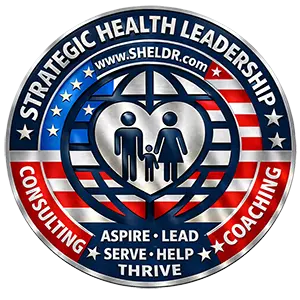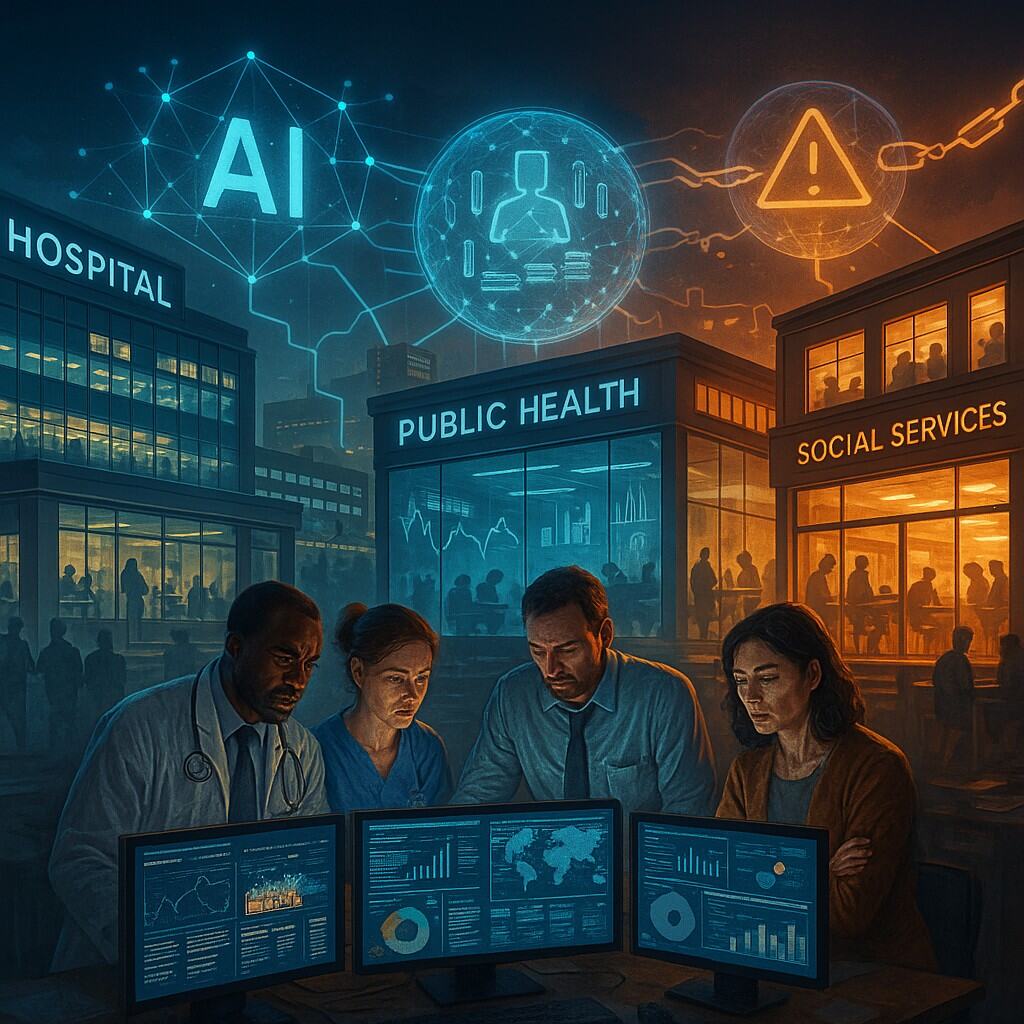
Blip-Zip Summary
AI is rapidly transforming healthcare, promising better patient outcomes, improved efficiency, and lower costs. I’ve said is before in previous articles on AI and Strategic Health Leadership (SHELDR), I’ll say it again. Senior leaders must embrace AI and develop key competencies like data literacy, strategic vision, and ethical leadership to thrive in this new era. Don’t get left behind – unlock the potential of AI for a healthier future!
Blip-Zip Takeaways
- AI is revolutionizing healthcare: From virtual assistants to drug discovery, AI is impacting every aspect of the industry.
- Leaders must embrace AI: Upskilling your workforce, prioritizing strategic areas, and ensuring ethical considerations are crucial for success.
- Develop key competencies: Data literacy, strategic thinking, and change management are essential for thriving in the AI-driven healthcare landscape
Key Words and Themes
Artificial Intelligence (AI) Driven Healthcare and Human Services, Leadership competencies, Ethics, Leadership Development, Future of Health
Table of Contents
Welcome to the Brave New World of Artificial Intelligence (AI) in Healthcare and Human Services Sectors
You can’t read the news without some mention of artificial intelligence (AI) in healthcare and the human services sectors. Recent years have witnessed an explosion in AI applications within the health and human services sectors. This transformative technology is poised to revolutionize every facet of the industry, from preventive health and clinical diagnoses to research and public health interventions.
From chatbots that answer patient queries to algorithms that detect disease patterns, AI is rapidly making its mark. Goldman Sachs predicts AI investments to approach $200 billion globally by 2025. According to a Bain and Company report, generative AI promises to drive significant productivity gains, improve patient and provider experience, and ultimately lead to better clinical outcomes. The technology could lower administrative costs, speed biomedical research and drug development, improve claims management, and help develop next-generation diagnostic equipment.
Regulatory bodies are also taking notice, with frameworks for AI in healthcare and the human services sector like the EU’s General Data Protection Regulation (GDPR). US Food and Drug Administration’s (FDA) AI regulatory guidance is providing much-needed clarity and ethical considerations.
As senior health leaders, navigating this brave new world requires not only an open mind but also a proactive embrace of AI’s transformative potential. This article will equip you with the knowledge and tools to become an AI champion, shaping the future of healthcare for the benefit of patients, organizations, and society at large.
Heard You About the Top 7 Applications of AI In Healthcare and Human Services Sectors?
The Health and human services sectors are not immune to the AI adoption wave. In a recent survey of healthcare executives, 58% say their organization is likely to implement or purchase some type of AI solution within the next year. The potential applications of AI in healthcare are vast and varied. Here are five key areas where AI is poised to make a significant impact:
- Virtual Assistants and Chatbots: AI-powered virtual assistants can answer patients’ questions, schedule appointments, and provide basic healthcare information, freeing up human resources for more complex tasks.
- Question Answering and Information: Platforms like Babylon Health’s chatbot answers patient questions about symptoms, conditions, and provides basic health information. Boston Children’s Hospital uses Buoy Health offers AI-powered symptom checker and health information chatbots.
- Appointment Scheduling: Zocdoc uses AI to learn user preferences and schedules appointments with suitable doctors efficiently. In 2022, they reported scheduling over 250 million appointments.
- Human Resource Relief: Cleveland Clinic became one of the first systems in the country to leverage artificial intelligence (AI), in the form of chatbots, to provide the most algorithmic forms of genetic counseling.
- Enhanced Diagnostics: AI-powered image recognition can assist radiologists in detecting subtle abnormalities in medical scans, leading to earlier diagnosis and improved treatment outcomes.
- Image Recognition: Google AI’s DeepMind system achieved superior performance in detecting breast cancer on mammograms compared to human radiologists.
- Early Diagnosis: Zebra Medical Vision’s AI platform analyzes X-rays for fractures, leading to a 20% decrease in missed fractures and faster treatment.
- Improved Outcomes: Paige AI’s technology assists pathologists in analyzing cancer biopsies, leading to more accurate diagnoses and improved treatment plans.
- Robotics: Potential aid for consumers with disabilities living in the community and for aging in place
- Disability Assistance: Ekso Bionics’ exoskeleton helps individuals with spinal cord injuries walk. In 2022, 10,000+ patients reported improved mobility.
- Aging-in-Place: Robot companions such as ElliQ, Vector, and Biscuit provide social interaction and reminders for elderly individuals, reducing loneliness and improving well-being.
- Quality of Life Improvement: SoftBank Robotics’ Pepper robot assists with daily tasks like medication reminders and communication, enhancing independence for individuals with disabilities.
- Virtual Care and Follow-Up: AI platforms can be used to contact consumers daily about treatment plans, confirm their medication plan for the day, and ask about their physical and mental well-being, including side effects.
- Treatment Plans and Medication Management: Babylon’s AI platform delivers personalized health coaching and medication reminders, resulting in improved medication adherence and patient outcomes.Mental Well-being: Woebot, an AI chatbot therapist, provides cognitive behavioral therapy for depression and anxiety. Studies show significant symptom reduction and improved well-being.
- Physical Health Maintenance: Livongo uses AI-powered coaching and remote monitoring to manage chronic conditions like diabetes, leading to improved blood sugar control and reduced hospitalizations.
- Precision Medicine: AI can analyze vast datasets of patient information, including genetic and clinical data, to tailor treatments and interventions to individual needs, ushering in a new era of personalized healthcare.
- Tailored Treatments: Foundation Medicine’s AI-powered genomic analysis platform helps identify targeted cancer therapies, leading to improved response rates and patient survival.
- Personalized Interventions: Freenome AI analyzes blood tests to detect early-stage cancers, enabling personalized interventions before symptoms appear.
- Revolutionizing Healthcare: The All of Us Research Program uses AI to analyze genetic and health data from over a million participants, leading to breakthroughs in understanding and treating various diseases.
- Predictive Analytics: AI algorithms can analyze trends and identify patterns in patient data, enabling proactive disease prediction and prevention, ultimately saving lives and reducing healthcare costs.
- Disease Prediction: AI models predict hospital readmission risk, facilitating preventative interventions and reducing readmissions.
- Life-Saving Potential: Use of AI AI to predict and prevent sepsis, a life-threatening condition, with its system achieving greater accuracy.
- Cost Reduction: AI App platforms can predict heart failure complications, enabling early intervention and reducing unnecessary hospital stays.
- Drug Discovery and Development: AI can accelerate the drug discovery process by simulating molecular interactions and identifying potential drug candidates, leading to faster development of life-saving medications.
- Accelerated Process: Insilico Medicine is using AI to create an entirely new AI-driven drug discovery pipeline from A to Z.
- Life-Saving Medications: BenevolentAI is advancing BEN-34712, its experimental oral therapy for amyotrophic lateral sclerosis (ALS), to late-stage preclinical studies.
- Faster Development: Atomwise uses AI to design new drug molecules, contributing to the development of several drugs in clinical trials for various diseases.
These are just a few examples of the many ways AI is revolutionizing healthcare. As research and development continue, we can expect even more innovative applications that improve patient care, save lives, and reduce healthcare costs in the years to come.
How Senior Leaders Must Leverage AI in Healthcare and Human Services Sectors
Only 25% of healthcare organizations have deployed generative AI solutions, but that is expected to more than double in 2024 year as executives see opportunities to automate clinical documentation and improve patient communication. According to a new KLAS report, 58% of healthcare executives say their organization is likely to implement or purchase a solution within the next year.
The National Academy of Medicine gives a great overview of the challenges. Of those considering AI in healthcare technology purchases, documentation, patient communication, imaging, revenue cycle management, predictive analytics, patient engagement, and workflow automation are primary areas of interest. As senior health leaders, embracing AI is not merely an option; it’s an imperative. Here are key strategies to leverage its transformative potential:
- Build An AI In Healthcare and Human Services Literate Workforce: Upskill your team with the knowledge and understanding of AI’s capabilities and limitations, fostering a culture of innovation and collaboration. Cleveland Clinic’s Center for Artificial Intelligence and Data Science engages with other institutes and groups within Cleveland Clinic to support and strengthen activities and initiatives for research, process improvements and clinical care enhancements.
- Identify Strategic Priorities: Align AI initiatives with your organization’s goals, focusing on areas where AI can improve patient outcomes, operational efficiency, or cost-effectiveness.
- Embrace Ethical Considerations: Ensure your AI implementations adhere to ethical principles, including data privacy, transparency, and fairness, building trust with patients and stakeholders. Stanford Medicine launched the initiative, RAISE-Health or Responsible AI for Safe and Equitable Health.
- Foster AI-Partnerships: Collaborate with technology companies, research institutions, and other healthcare organizations to share knowledge, resources, and expertise in developing and implementing AI solutions. For example, one of the principles of the MEDITECH partnership with Google was to embed the functionality directly into a physician’s workflow.
- Measure And Track Results: Continuously evaluate the impact of your AI initiatives, using data-driven insights to refine and improve your approach, ensuring a return on investment.
These are just a few examples and there are many other successful AI in healthcare and human services implementations of these strategies. It’s important to research and adapt these approaches to your specific organizational context and goals. For senior leaders is more important to build in AI-related competencies into leader development programs.
8 Competencies for the AI In Healthcare and Human Services Sector Era
Thriving in the AI in healthcare and human services landscape requires a new set of leadership competencies. As the health and human services sectors evolve with the integration of AI, professionals need to identify and develop skills. Embrace these skills can help you thrive in an AI-driven system. You can lead by example by getting to understand ChatGPT prompting. Here are some skills to enhance your role in the health and human services ecosystem:
- Understanding AI and Building Intuition: of new technologies entering the market is the first of three essential skills. C-suite executives in AI in healthcare and human services need an understanding of the potential of new technologies—and how they will change consumer experience, service costs, and competitive advantage.
- Data and Health literacy: The ability to understand and interpret data, utilizing it to inform your decision-making and AI initiatives.
- Strategic vision, strategy, and creativity: The ability to identify the potential of AI and translate it into actionable strategies for your organization.
- Process Reengineering: to get maximum performance and cost leverage from new technologies. Rarely are technologies successful that are forced to automate traditional, non-tech-enabled processes.
- Change management and Emotional Intelligence: The ability to navigate the challenges of implementing new technologies and guide your team through the transition.
- Teamwork, Collaboration, Communication: The ability to foster collaboration across different disciplines and effectively communicate the benefits of AI to stakeholders.
- Ethical leadership: The ability to ensure your AI implementations are ethical, transparent, and unbiased, upholding the highest standards of patient care.
- Target Costing: Target costing is an essential competence for the C-suite—understanding the market rates for services and how technology can be used to perform well (and profitably) within those constraints.
By identifying and developing the skills that set you apart from your peers, you can become an exceptional medical professional who thrives in an AI in healthcare and human services driven system.
Summary and Conclusion
The power of AI is likely to have transformative effects on the health and human service field. The question for executive teams is anticipating those changes in strategy and in practice. But then on your strategic roadmap for your business, which of these areas fit in your strategy? Where do you need help? The answers are what’s going to run your business.
The future of healthcare is inextricably linked to AI. By embracing this technology with vision, leadership, and ethical responsibility, senior leaders can pave the way for a transformed healthcare ecosystem that delivers exceptional patient care, optimized outcomes, and sustainable success. The choice is clear: Lead the AI revolution or risk being left behind.
This article has provided a comprehensive overview of AI’s potential to revolutionize healthcare. However, there’s always more to learn! Here are some suggestions for further exploration
Comments?
Deep Dive Discussion Questions
- Imagine you are presenting the potential of AI to your team. How would you explain the benefits of AI in a way that is clear, concise, and engaging?
- Consider the eight leadership competencies outlined in the article. Which competency do you believe is most critical for success in the AI-driven healthcare landscape? Why?
- How can senior leaders overcome potential resistance to AI adoption within their organizations?
- What strategies can be implemented to ensure responsible and ethical use of AI in healthcare, addressing concerns about bias and data privacy?
- As AI automates certain tasks, how can healthcare organizations ensure that human-centered care remains a priority?
- What potential challenges do you foresee in integrating AI into existing healthcare workflows and infrastructure?
- How can leaders leverage AI to address disparities in healthcare access and delivery, promoting greater equity and inclusivity?
- How can you effectively communicate the benefits and potential challenges of AI to your team and stakeholders?
- What specific AI applications hold the most promise for improving patient care and outcomes in your organization?
- How can you foster a culture of innovation and collaboration within your organization to support successful AI adoption?
Professional Development and Learning Activities
- Conduct a self-assessment of your current understanding of AI and its potential applications in healthcare.
- Participate in online courses or workshops on AI for healthcare leaders.
- Identify a specific area where AI could be implemented within your organization and develop a strategic plan for its adoption.
- Engage in discussions with colleagues and other healthcare professionals about the ethical considerations of AI in healthcare.
- Read industry reports and articles on the latest advancements and challenges in AI-powered healthcare solutions.
References, Resources, and Citations:
- Artificial intelligence: Opportunities and challenges in NP https://journals.lww.com/tnpj/Fulltext/2023/04000/Artificial_intelligence__Opportunities_and.2.aspx
- World Economic Forum. The future of jobs report 2022. https://www.weforum.org/publications/the-future-of-jobs-report-2023/
- Transforming healthcare with AI: The impact on the workforce and organizations. https://www.mckinsey.com/industries/healthcare/our-insights/transforming-healthcare-with-ai
- Stanford Medicine. Responsible AI for Safe and Equitable Health (RAISE-Health). https://med.stanford.edu/raisehealth
- Cleveland Clinic. (2023). Center for Artificial Intelligence and Data Science. https://my.clevelandclinic.org/departments/pathology/depts/artificial-intelligence-data-science
- Kaiser Permanente coordinates real-world demonstrations of AI, machine learning in health care. https://divisionofresearch.kaiserpermanente.org/kaiser-permanente-ai-machine-learning-in-health-care/
- Thriving in an AI World: Healthcare insights. https://kpmg.com/us/en/articles/2023/thriving-ai-world-healthcare.html
- Meditech, Google partner to bring generative AI to EHRs. https://www.beckershospitalreview.com/digital-health/meditech-google-partner-to-bring-generative-ai-to-ehrs.html
- Insilico Medicine. AI-Powered Drug Discovery Pipeline Articles. https://insilico.com/
- BenevolentAI. AI-enabled drug discovery. https://www.benevolent.com/
- Atomwise. Artificial Intelligence for Drug Discovery. https://www.atomwise.com/
Other SHELDR Articles You Might Like
SHELDR Archives
- October 2025
- July 2025
- May 2025
- April 2025
- December 2024
- November 2024
- October 2024
- September 2024
- August 2024
- July 2024
- June 2024
- May 2024
- April 2024
- March 2024
- February 2024
- January 2024
- August 2023
About the Author
I am passionate about making health a national strategic imperative, transforming and integrating health and human services sectors to be more responsive, and leveraging the social drivers and determinants of health (SDOH) to create healthier, wealthier, and more resilient individuals, families, and communities. I specialize in coaching managers and leaders on initial development, continuously improving, or sustaining their Strategic Health Leadership (SHELDR) competencies to thrive in an era to solve wicked health problems and artificial intelligence (AI).
Visit https://SHELDR.COM or contact me for more BLIP-ZIP SHELDR advice, coaching, and consulting. Check out my publications: Health Systems Thinking: A Primer and Systems Thinking for Health Organizations, Leadership, and Policy: Think Globally, Act Locally. You can follow his thoughts on LinkedIn and X Twitter: @Doug_Anderson57 and Flipboard E-Mag: Strategic Health Leadership (SHELDR)
Disclosure and Disclaimer: Douglas E. Anderson has no relevant financial relationships with commercial interests to disclose. The author’s opinions are his own and do not represent an official position of any organization including those he consulted. Any publications, commercial products, or services mentioned in his publications are for recommendations only and do not indicate an endorsement. All non-disclosure agreements (NDA) apply.
References: All references or citations will be provided upon request. Not responsible for broken or outdated links, however, report broken links to [email protected]
Copyright: Strategic Health Leadership (SHELDR) ©




